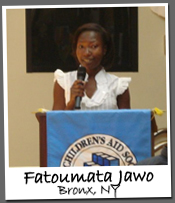I have been involved in the Children’s Aid Society Hope Leadership Academy for three years. Hope Leadership Academy partners with other Children’s Aid Society (CAS) programs and sponsoring companies to provide courses and activities that interest and challenge afterschool participants. This summer I had a Community Schools internship with New York City Council Member Inez E. Dickens’ office. That experience has taught me important life lessons and helped me mature. My first project as an intern was to reach out to the business owners on 116th street in Harlem, most of whom are African. I wrote a letter to them explaining how Councilwoman Dickens was trying to assist them. At first, I thought the letter-writing would be the hardest part of the assignment. Since I am Senegalese, I thought that approaching other members of the African community would be easy. I went into my first meeting looking very business-like and wearing a bright smile. I wasn’t feeling very confident but I thought if I could hide it, no one would know. The first business owner I approached with my office director was nice and listened to what I had to say. After my office director left me to handle the rest of the businesses by myself, I started to realize how disconnected I was from my African culture. As I went into other businesses, even though I clearly look Senegalese, many of the owners approached me in their own languages. And to make matters worse, I have not spoken Wollof (the Senegalese native language) for about four years and I was unable to express myself in it. The project started to get harder by the minute. Some of the business owners spoke little English and had difficulty understanding me. Other than nodding their heads, they gave me little or no response. I would have cried if I hadn’t been in the middle of the street. I got very frustrated and my self-esteem dropped dramatically. I was ready to give up on my very first day. I talked to the CAS coordinators and they helped me realize that most African people in the U.S. are unaware of the help that is out there for them. I gained back some of my confidence and learned I needed patience to make it through the day. With this knowledge I began to approach the business owners in Wollof. Once I got their attention, I explained why I was there. Not only didn’t they seem intimidated by my approach, they actually opened up to me and started telling me some of the challenges they were facing. To be honest, some of the business owners did turn me away, but in retrospect, those were the people who really motivated me to finish my project. If it weren’t for the challenges I faced as I approached those entrepreneurs, I would not have learned the importance of patience and self-esteem. Most importantly I have learned to embrace a culture I had once abandoned. | 







